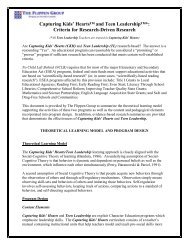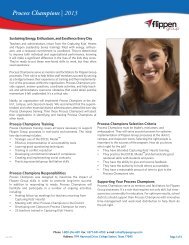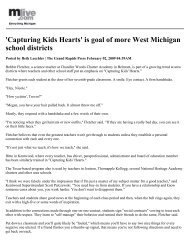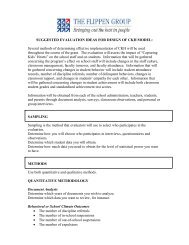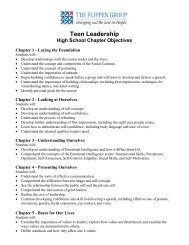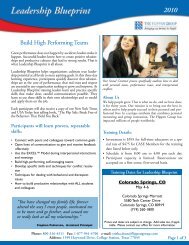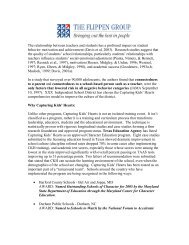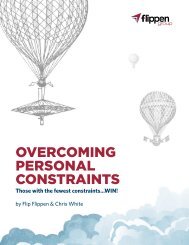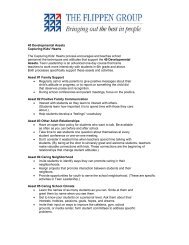Smart & Good High Schools - The Flippen Group
Smart & Good High Schools - The Flippen Group
Smart & Good High Schools - The Flippen Group
- No tags were found...
Create successful ePaper yourself
Turn your PDF publications into a flip-book with our unique Google optimized e-Paper software.
CHAPTER 6: Commonly Asked Questions about <strong>Smart</strong> & <strong>Good</strong> <strong>High</strong> <strong>Schools</strong>for others—who define success in terms of buildinghealthy families, leading a life of integrity, and contributingto the common good.We need more people who definesuccess in terms of leading a life ofintegrity and contributing to thewelfare of others.What we think schools do not have time for is overloadingthemselves with too many disconnected practices and programsthat are not aligned with the truly important outcomes,those that will help young people lead flourishinglives.Will it take time to implement the <strong>Smart</strong> & <strong>Good</strong> <strong>High</strong><strong>Schools</strong> vision in a way that truly integrates excellenceand ethics in all phases of school life? You bet. But we feelthat the time invested in that mission will contribute tothe most important goals of cutting-edge high schoolreform and to the education of the whole person.What difference does your focus on character and integratingethics and excellence make in terms of what ateacher or school actually does?Whether you’re teaching a student to do calculus, write apersuasive essay, understand history, or play a musicalinstrument, you always keep in mind two fundamentalquestions: First, what is the contribution of character to thischallenge? Are students not turning in homework becausethey don’t know how to be organized, manage their time,and persevere? Do we have put downs, exclusion, and bullyingin our school because we haven’t invested time indeveloping character qualities such as respect and caring?Second, how might handling this issue with a character focushelp students and our community—now and in the future? Forexample, if we develop strong norms of collective responsibilityin our schools, will students be better teammatesnow and better employees and citizens as adults? If wecultivate integrity through our honor code, will it helpour young have more honest relationships later in life?When you keep a focus on character, there’s both a shorttermpayoff and a long-term payoff regardless of thelearning task you’re working on.How does your vision meet workforce needs—includingthe demands of the high-tech global economy?On this point, the research coming out of business andindustry is pretty clear: <strong>The</strong>y want and need people ofstrong performance character—people with attention todetail, timeliness, work ethic, diligence, and ingenuity.<strong>The</strong>y also want people of moral character—people withstrong interpersonal skills, integrity, and a sense of socialresponsibility.This was the lesson we took from Jim Collins’s book <strong>Good</strong>to Great. Companies that made the leap from good togreat performance said that education and skill level areimportant, but qualities of character are more important.This is as true for students graduating with hopes of workingin a blue-collar trade as it is for students graduatingwith hopes of going to college and then into a white-collarprofession.We obviously also need to prepare our students for thehigh-tech jobs many of them will have in the global economy.<strong>The</strong> character strengths that have guided the greatscientists, statesmen, inventors, and entrepreneurs of thepast will serve today’s workers as well. In the highly competitiveglobal economy they’ll need the performancecharacter qualities we’ve named before: diligence, perseverance,ingenuity, and so on. <strong>The</strong>y’ll need to work collaboratively;they’ll need to be good teammates who bringout the best in those they work with; they’ll need to beopen to new ideas and new ways of thinking. <strong>The</strong>se qualitiesare a matter of character.Companies that went from good togreat considered character qualitiesmore important than technical skills.In a world of rapid technological growth, there’s an evengreater need for highly developed ethical thinking andmoral character. We need students who are not simplyprepared to compete in the global economy, but also ableto grapple with the ethical challenges of our age. How dowe avoid the destruction of the environment on which alllife depends? What is the dignity of the human person?What is a reasonable wage? What is the value of life? Whatpromotes peace instead of war? Justice instead of a growinggap between the rich and the poor?Your report features lots of practices; which practicesare most important?It depends on your particular challenges and your existingassets. Consider the key ideas in the <strong>Smart</strong> & <strong>Good</strong><strong>High</strong> <strong>Schools</strong> vision and the range of practices for implementingthem. Determine which among them fills a voidthat you’re not currently addressing, strengthens a structurethat you have in place but isn’t as strong as it could215<strong>Smart</strong> & <strong>Good</strong> <strong>High</strong> <strong>Schools</strong>




